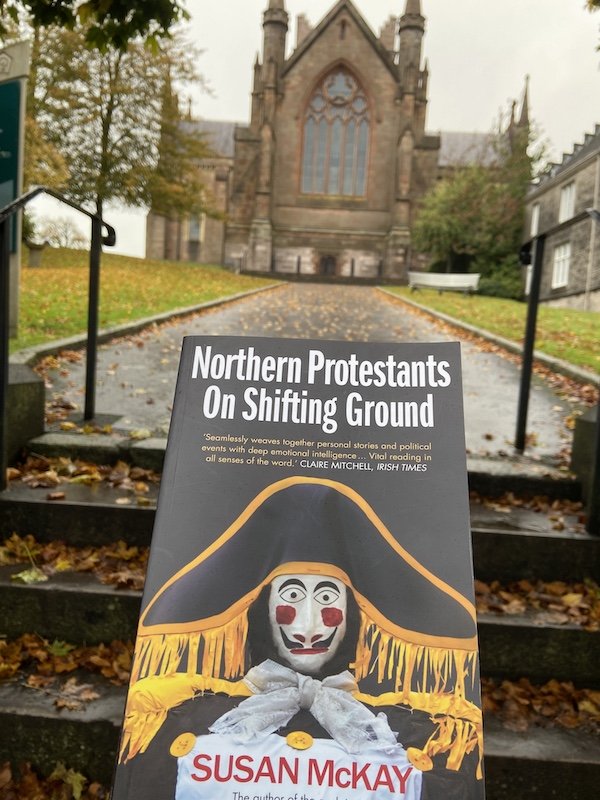Book Review - Northern Protestants On Shifting Ground
I didn’t interact with Protestants my own age until I went to college as a teenager. Sure, I knew they existed, and they were identifiable by their different school uniforms as they quickly walked through 'our' estate on their way home. They announced themselves during the thunderous parades that would pass close by our house a couple of times a year, when we'd be ushered indoors. It was very much 'us' and 'them'. I helped a protestant man on his milk round, but as we sat and ate sandwiches, we didn’t talk so much. It was more - red top for number 52, make sure Mrs Murphy at 16 pays you for the cream from last week. That sort of thing. We had different schools, played different sports. There were a couple of protestant owned businesses but they were mostly concentrated at one end of the small town we were from. After a riot one year during a loyalist parade, it was noticeable that whilst the old priests house and nearby residences were wrecked, the protestant shops were left alone.
It wasn't until I was sixteen that I met and talked to protestants my own age. Some of them liked the same music as me! We shared a love of similar books and movies! There was an initial wariness but the barriers soon came down, or as much as they could as the conflict was still ongoing. It still wouldn’t have been safe to visit each others areas. But yet, here we were in a shared, safe, space, mingling and socialising together. And hey, now they weren’t wearing those uniforms, the protestant girls……..
That's how it was. And of course it soon removed from me the notion that Protestants in the North of Ireland were one large, groupthinking monolithic block. They weren't then, and they aren't now.
Enlightening
This is an enlightening, sometimes depressing, but ultimately hopeful book I think. It's a completely riveting read, as the author visits communities in each part of the north to gauge opinions on the state of the union and how the protestant community is feeling on a range of issues. Susan McKay first visited this topic twenty years ago, when the north was still basking in the glow of the early days of the ceasefires. There was much genuine optimism back then, with the hope that we would never return to the days of conflict. People wanted to see their communites prosper. And yet, twenty years and what has changed? Firstly, for the better, blood isn't flowing on the streets. But communities aren’t prospering and the seismic tremors of brexit are only beginning to be felt. With changing demographics, many protestant people are feeling insecure about their place in the union. There's constant, unsettling chatter about a poll for a united Ireland, for the first time in years.
Most of the people who are interviewed aren't the same red angry faces we see on our tv's on a daily basis, talking like they are the spokesman (for they are mostly men) for the whole unionist/protestant/loyalist community. Susan talks to artists, entrepreneurs, community activists, bandsmen, church leaders and writers, ex policemen and ex paramillitaries. Victims and survivors too, of course. A true cross section of society.
There’s an effortless flow to the writing in the book, and I especially liked the way Susan McKay represents and moves between the individual voices. The different stories and opinions are wonderfully textured and interwoven, and the author has a real eye for detail. She’s present and offers her own take on things, but it’s never jarring and always eloquent.
Thought provoking
I found it an extremely thought provoking book. Many of the participants talk about how they are moving away from orange/green politics to left/right issues which are effecting communities. I was particularly taken with the politics of Dawn Purvis, ex of the PUP, and how she was much more interested in tackling inequality in education, health and gender. Or the frustration felt by Anton, a young gay man who now feels ostracised from his community.
Some of it is familiar and depressing - the threats of violence if the protocol, this months loyalist bogeyman, is not removed. The ultra conversative fire and brimstone views of some of the religious leaders interviewed. And the sheer hopelessness of some of the young people. The pain of people who lost loved ones during the troubles is still understandably raw in many cases, compounded by the governments recent pronouncements on how they are treating the legacy of the troubles. The RHI scandal gets a few mentions too.
What is it to be protestant anyway? Is the rangers fan we meet who's learning Irish any less so? And what about the black female Nigerian rector in rural Fermanagh, where does she fit in?
Ultimately I found there to be much to be optimistic about in the these pages. Feminism in particular is striving for change and you can only feel optimistic with so many driven women featuring strongly, looking to make the shift to issues that need to be tackled. As usual, the politicians, especially of an unionist ilk, are far behind the people when it comes to change and the feeling on the ground. People are less energised and angry about constitutional issues than they have ever been. Ask the mother of three children in the queue for the food bank whilst weathering the cut in universal credit how she feels about the border in the Irish Sea, when she’s wondering whether to pay for food or electricity.
United Ireland
The bogeyman of a United Ireland features on a number of occasions, and I think there's a lot of grounds for optimism there too. With so many progressive people featured, why can't we create a fairer and more equitable society, with one education system, one health system and one progressive, forward thinking, properly green Ireland? Last time I checked, there was orange in the flag too.
This is an especially interesting book in light of the protocol and the Windsor framework in the news, and the schism that some unionists feel has been created with the ‘imposition’ of a border in the Irish Sea.
It will be interesting to see if Susan revists the topic in twenty years. Maybe the title would be - 'A settled people, on firmer ground', having taken their place in a new Ireland where they had proper representation in parliament, their customs and traditions protected and they weren't subject to the whims of an increasingly weary and hostile westminster government. Much to think about in this vital book.
Book Review - Northern Protestants on shifting ground by Susan McKay
346 pages, Paperback
Published by Blackstaff Press


